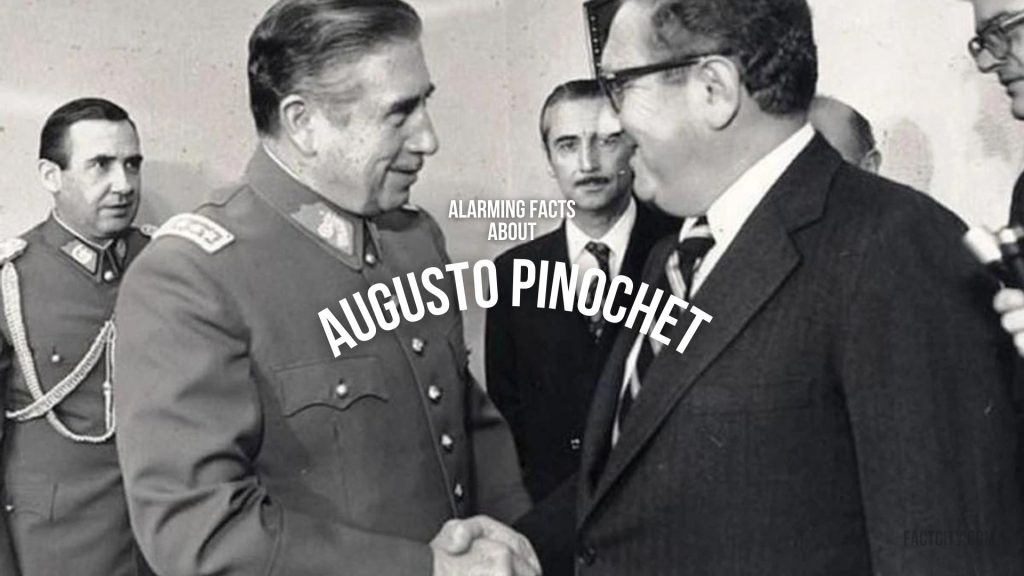Augusto Pinochet is one of the most infamous names in world political history. Known for being a dictator for well over a decade, the man left a legacy of violence, fear-mongering, and cruelty. But how much do you know about the Chilean dictator? Here are some interesting facts about Augusto Pinochet worth remembering.
1. Pinochet was born into a middle-class family during the First World War.
Augusto Pinochet was born on November 25th, 1915, in Valparaíso, Chile. He was born into middle class – he came from privilege, according to historians.
2. He quickly pursued a military career.
Pinochet graduated from the Military Academy in 1936. He eventually rose through the ranks of the Chilean Army and became a General in 1972. He then served as the Commander-in-Chief of the Chilean Army from 1973 to 1998.
3. He was key in Chile’s infamous coup d’état in the early 1970s.
Augusto Pinochet infamously hit the headlines by playing a key role in the military coup that ousted President Salvador Allende on September 11th 1973. The coup marked the beginning of Pinochet’s dictatorship.
4. He soon formed a military junta.
Following the coup d’état, Pinochet established a military junta that assumed control of the Chilean government. Naturally, he became the ruler of the country with absolute power.
5. He was a violent ruler who didn’t back down.
Augusto Pinochet’s regime was characterized by violence. It was a regime under authoritarian rule, censorship, and widespread human rights abuses. He even dissolved the Chilean Congress and banned political parties, ensuring his long-lasting rule.
6. He famously murdered his opponents.
His regime was known for its political repression. He condoned the arrest, torture, and execution of thousands of perceived political opponents. In fact, the National Stadium in Santiago was used as a detention and torture centre during his rule. The government carried out the “Caravan of Death” in 1973, a series of extra-judicial executions of political prisoners. The victims were opponents of the regime and were killed by a military death squad. It’s thought over 3,000 people “disappeared” through Pinochet’s bloody rule.
7. He brought in a new constitution for Chile by the 1980s.
In 1980, Pinochet implemented a new constitution. This was a strategic move as the new constitution allowed him to remain in power until 1990. However, it also included provisions for a gradual return to civilian rule through elections.
8. He eventually held a plebiscite to decide upon his future.
In a bold move in 1988, Pinochet held a plebiscite or national referendum to determine whether he would continue as president for another eight years. As you might imagine, the majority of Chileans voted against extending his presidency. This led to Pinochet eventually peacefully handing over power to Patricio Aylwin, who was democratically elected. This meant that Chile could transition back to civilian rule.
9. Pinochet was eventually caught and brought to trial.
Thankfully, Pinochet faced legal challenges for human rights abuses committed during his regime. He was arrested in London in 1998 following the request of Spanish judge Baltasar Garzón. Pinochet returned to Chile in 2000, and his legal battles continued. However, he avoided trial in Chile due to his declining health. Therefore, he was not held accountable for human rights violations during his rule.
10. He left a complicated legacy in his homeland.
Augusto Pinochet died on December 10th, 2006, at the age of 91. Strangely, his legacy remains divisive in Chile. Some view him as having been a defender of the country against communism. On the other hand, others condemn him for his countless human rights abuses. Many are embittered that Pinochet died before he could face true justice for his alleged crimes.
FAQs about Augusto Pinochet
Did the CIA put Pinochet in power?
Incredibly, yes, the CIA did help to put Augusto Pinochet in a position of power in Chile. They supported him in overthrowing the Allende with the military junta.
What did Pinochet do to the economy?
Pinochet famously helped Chile’s economy to boom. However, in doing so the way that he did, he also created further disparity in wealth between the different classes.
Why wasn’t Pinochet prosecuted?
Despite facing prosecution in Chile, Augusto Pinochet used his status as an ex-president to gain immunity from prosecution. In fact, it also gave him a financial allowance!
Further reading
https://facts.uk/tag/Presidents
https://www.washingtonpost.com/wp-srv/inatl/longterm/pinochet/overview.htm
https://www.history.com/topics/south-america/augusto-pinochet
Do you know any interesting facts about Augusto Pinochet? Share them in the comments section below!
